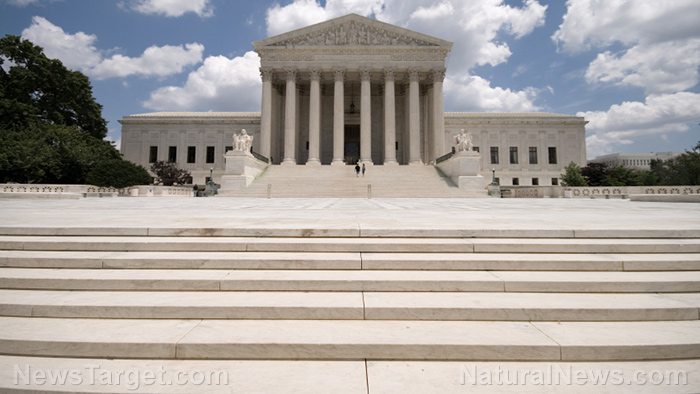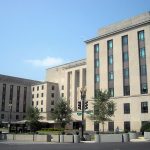
Supreme Court weighs birthright citizenship restriction amid claims of executive overreach
Friday, April 18, 2025 by Willow Tohi
http://www.progress.news/2025-04-18-supreme-court-weighs-birthright-citizenship-restriction.html

- The U.S. Supreme Court will hear arguments on May 15 regarding Trump’s executive order restricting birthright citizenship, challenging interpretations of the 14th Amendment and presidential authority. The policy denies automatic citizenship to children born to non-citizen parents lacking permanent residency.
- The administration argues the phrase “subject to the jurisdiction thereof” excludes children of undocumented or temporary residents, claiming past interpretations overextended birthright citizenship. Opponents cite Wong Kim Ark (1898), asserting jurisdiction covers all except diplomats or invaders.
- Twenty-one states and civil rights groups warn the policy creates statelessness, confusion and racial profiling risks. They defend nationwide injunctions to prevent unequal citizenship rights across states, framing birthright citizenship as foundational to equality.
- The ruling, due by July, could redefine presidential power over immigration or reinforce judicial checks. It may establish a precedent for citizenship eligibility, escalating tensions over federal vs. state authority and the rights of immigrant communities.
- The case transcends immigration, testing core American principles: Who defines citizenship? A decision upholding the order could politicize birthright rights, while a rejection may cement the 14th Amendment’s role as a safeguard against exclusionary policies. The outcome will shape the nation’s identity for generations.
On April 17, the U.S. Supreme Court announced it would review President Donald Trump’s executive order curtailing birthright citizenship, setting oral arguments for May 15. The case, Trump v. Maryland et al., tests the legal and political boundaries of presidential authority, immigration policy and the enduring interpretation of the 14th Amendment. The administration’s January 20 order—titled “Protecting the Meaning and Value of American Citizenship”—targets children born in the U.S. to parents without legal residency or on temporary visas, denying them automatic citizenship unless a parent holds citizenship or a green card. While the justices delayed suspending lower court injunctions blocking the policy, their swift decision to hear the case underscores its high stakes in a nation reckoning with immigration and federal power dynamics.
The 14th Amendment and the jurisdictional debate
At the heart of the dispute is Section 1 of the 14th Amendment, ratified in 1868 to guarantee citizenship to all born on U.S. soil “subject to the jurisdiction” of the United States. Originally designed to overturn Dred Scott v. Sandford (1857), which denied citizenship to enslaved individuals and their descendants, the amendment’s modern interpretation faces sharp debate.
The Trump administration argues that “birthright citizenship has been wrongly expanded” beyond the Constitution’s intent, pointing to the phrase “subject to the jurisdiction thereof” as excluding those in the U.S. unlawfully or temporarily. The executive order specifies that children born to mothers who are either “unlawfully present” or here “lawfully but temporarily”—such as tourists, students, or visa holders—will not automatically qualify for citizenship if the father is not a citizen or green-card holder.
“This provision rightly repudiated the Supreme Court’s shameful decision in Dred Scott,” the order states, framing its narrower interpretation as a correction of historical injustice while avoiding auto-birthright citizenship for a “special class” of foreigners. The administration has called the lower court injunctions “lupine encroachments”—Latin for “wolf-like” overreach—on executive power in a March filing, claiming district judges improperly block policies nationwide without proven harm to plaintiffs.
Yet legal scholars and opponents highlight that non-citizen residents, including lawful temporary visitors, historically fall under U.S. jurisdiction, as defined in United States v. Wong Kim Ark (1898). This 1898 precedent, which ruled that children born to legal, non-citizen residents become citizens, established that “jurisdiction” applies to all except diplomats or hostile invaders, a view embraced by opponents to counter the administration’s stance.
States and advocacy groups: A clash over equity and chaos
Twenty-one plaintiff states, including Maryland, Massachusetts and Washington, argue Trump’s policy “destroys birthright citizenship as we know it,” risking “statelessness” for infants and “confusion” over citizenship requirements. In court filings, they accuse the administration of creating a patchwork of unchecked authority: “The government would have citizenship depend on whether your parents are litigants or even live in certain states,” wrote attorneys for the coalition.
The states emphasize that nationwide injunctions are necessary to prevent “absurdity”: if injunctions apply only to specific regions, federal agencies would face conflicting mandates, leaving newborns in some states as citizens while others are deemed “not subject to U.S. jurisdiction.” They rejected the administration’s “modest” framing, writing that the policy “tramples the republic’s longstanding pact that all Americans, born here, carry equal rights.”
Meanwhile, civil rights groups and Democrats have amplified concerns that the policy could incentivize racial or ethnic profiling, given the disproportionate impact on Latino and immigrant communities. “This isn’t about the law—it’s about sowing fear and amplifying political divisions,” said Cecilia Munoz, a Federal Reserve Board member.
The administration responds that the order only “clarifies” eligibility, not erasing longstanding exceptions. Secretary of Homeland Security Tom Ridge argued in a press briefing that the policy “restores accountability to citizenship” by ensuring benefits align with legal residency.
Constitutional tensions and the path forward
The Court’s ruling, expected by July, will either uphold a conservative vision of restrained birthright citizenship or reinforce the judiciary’s role in checking executive overreach. If upheld, the order could reshape immigration policy by allowing the president to redefine citizenship through executive action—a precedent with unclear implications for future administrations. Opponents warn it would destabilize U.S. demographics by creating a new underclass, while supporters argue it upholds national sovereignty over border control.
Historically, Supreme Court justices have avoided revisiting birthright citizenship, but this case may force a reckoning with the 14th Amendment’s limits. A decision overturning the injunctions would immediately halt the administration’s policy—creating a prolonged legal stalemate—while a ruling in favor could pit federal guidance against states’ rights battles.
Regardless of the outcome, the case has already deepened partisan fissures over fundamental questions: What does it mean to be an American? Who holds the power to define it? And who are we, as a nation, willing to exclude?
The legacy of a judicial choice
The Supreme Court’s decision will reverberate far beyond immigration policy, defining constitutional norms that balance federal authority, state rights and the unalienable rights of immigrants. As the Court faces this 21st-century dilemma, its ruling will either solidify birthright citizenship as an irrefutable pillar of American identity—or open it to political discretion, reshaping the nation’s social fabric for generations. The May arguments will not just decide the fate of newborn children but also who inherits the “priceless” rights of American citizenship.
Sources include:
Tagged Under: Tags: birth tourism, birthright citizenship, citizenship, executive order, invasion usa, migrants, national security, States Rights, Supreme Court, Trump, White House
RECENT ARTICLES


Declassified Biden-Era domestic terror strategy reveals broad surveillance, tech partnerships, and global speech regulations that violate the Constitution

Google’s ad tech monopoly ruled ILLEGAL in historic ruling
By Cassie B.

A win for free speech: State Department SHUTS DOWN controversial disinformation office
By Ramon Tomey

Trump opposes new gun control measures: Guns are not the root cause of violence
By Laura Harris
COPYRIGHT © 2017 PROGRESS NEWS


